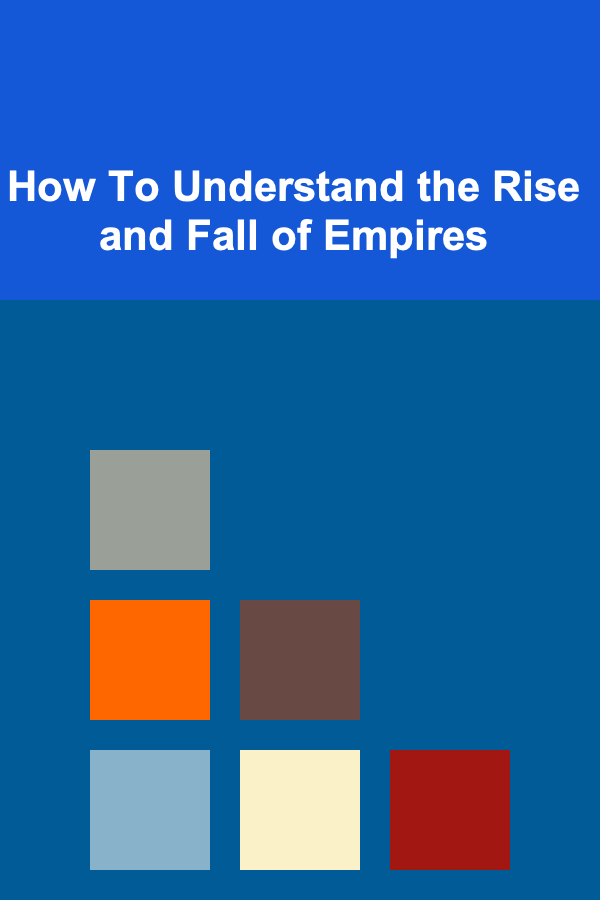
10 Tips for Staying Productive as a Scientist
ebook include PDF & Audio bundle (Micro Guide)
$12.99$7.99
Limited Time Offer! Order within the next:
Not available at this time

As a scientist, staying productive is essential for advancing your research, publishing papers, and contributing to your field. However, the path to productivity is not always straightforward. The work can be challenging, and the demands on time and attention can be overwhelming. Between experiments, writing papers, data analysis, and administrative tasks, it can be hard to stay on top of everything.
Productivity is not just about working longer hours; it's about working smarter. The key to maintaining productivity lies in adopting effective strategies, maintaining focus, and ensuring that you are managing your time and resources efficiently. In this article, we will explore 10 tips that can help you stay productive as a scientist.
Set Clear, Achievable Goals
One of the most important strategies for staying productive is setting clear and achievable goals. Without specific goals, it is easy to become distracted or overwhelmed. By setting goals, you create a roadmap for your work that guides your actions and priorities.
How to Set Clear Goals:
- Break down large projects: Large, complex projects can feel daunting. Break them down into smaller, manageable tasks. For example, instead of a vague goal like "complete research," try something more specific like "complete literature review on X topic."
- Use SMART goals: SMART stands for Specific, Measurable, Achievable, Relevant, and Time-bound. This method ensures your goals are well-defined and attainable within a set timeframe.
- Track progress: Use tools like checklists or project management software to track progress and stay motivated.
By setting concrete goals, you can maintain a sense of direction and purpose in your work, reducing stress and boosting your productivity.
Prioritize Your Tasks
The world of science can be filled with numerous competing tasks, from reading papers and attending conferences to running experiments and analyzing data. To stay productive, it is essential to prioritize these tasks effectively.
How to Prioritize Tasks:
- Identify urgent vs. important tasks: Use the Eisenhower Matrix to categorize tasks into four quadrants: urgent and important, important but not urgent, urgent but not important, and neither urgent nor important. Focus on the tasks that are both urgent and important.
- Use the 80/20 rule (Pareto principle): This rule suggests that 80% of your results come from 20% of your efforts. Identify the 20% of tasks that have the greatest impact and prioritize them.
- Limit distractions: Say no to tasks or meetings that do not contribute to your core objectives, or delegate them where possible.
Prioritizing tasks helps you stay focused on what really matters, avoiding wasted effort on less critical activities.
Create a Structured Daily Routine
Having a structured daily routine helps to establish a sense of discipline and ensures that you are making progress on your goals. As a scientist, it's easy to get lost in the variety of tasks that demand your attention. A daily routine can help you allocate time effectively to both research and non-research activities.
How to Create a Productive Routine:
- Morning focus time: Start your day with uninterrupted, focused work. The morning is often when you are freshest, so use this time to tackle your most difficult or important tasks.
- Set fixed hours for meetings and emails: Check emails and attend meetings during designated times, rather than letting them interrupt your productive hours.
- Take breaks: Incorporate short breaks into your routine to avoid burnout and maintain mental clarity. The Pomodoro Technique, where you work for 25 minutes and take a 5-minute break, is a popular method.
A structured routine ensures that you remain focused, while also allowing time for rest and rejuvenation.
Minimize Distractions
Distractions can significantly hamper your productivity, especially in a research setting. Whether it's your phone, social media, or colleagues, staying focused requires minimizing interruptions.
How to Minimize Distractions:
- Turn off notifications: Disable non-essential notifications on your phone and computer to avoid interruptions while working.
- Create a quiet workspace: Set up a dedicated workspace that is free from distractions. If you work in a shared office, use noise-canceling headphones or find a quiet space.
- Use focus apps: Consider using apps like Forest or Freedom that block distracting websites or apps while you work.
By reducing distractions, you can increase your focus and get more done in less time.
Use Technology and Tools to Streamline Your Work
Technology offers many tools and resources that can help improve your productivity. From data management to communication tools, leveraging the right technologies can help you stay on top of your research and administrative tasks.
Useful Tools for Scientists:
- Project management software : Tools like Trello, Asana, or Monday.com can help you keep track of tasks, deadlines, and research progress.
- Reference management software: Tools like Zotero, EndNote, or Mendeley help you manage and organize research papers, making it easier to cite references in your writing.
- Data analysis tools: Software like R, MATLAB, or Python libraries streamline data analysis and visualization, saving you valuable time.
- Collaboration tools: Tools like Google Drive or Dropbox allow you to share documents and collaborate with colleagues, even remotely.
Technology can help you automate tedious tasks and stay organized, enabling you to focus on the critical aspects of your research.
Maintain a Healthy Work-Life Balance
Burnout is a common issue among scientists, especially those working long hours in demanding environments. To stay productive in the long term, it's essential to maintain a healthy work-life balance. This means not only focusing on your work but also making time for relaxation, exercise, and social activities.
Tips for Maintaining Work-Life Balance:
- Set boundaries: Define clear boundaries between work and personal life. Avoid checking emails or working late into the evening.
- Schedule time for exercise: Physical activity improves mental clarity and overall well-being. Schedule regular workouts or outdoor activities to recharge.
- Take vacations: Step away from work periodically to avoid burnout. Use your vacation days to refresh and come back to your research with renewed energy.
A balanced lifestyle promotes long-term productivity and overall well-being, reducing the risk of burnout.
Collaborate with Others
Science is increasingly collaborative, and working with others can greatly enhance your productivity. Collaborations bring new ideas, different perspectives, and shared expertise that can help you solve problems more efficiently.
How to Collaborate Effectively:
- Join research groups: Participate in interdisciplinary research groups to expand your knowledge and network.
- Ask for feedback: Seek constructive feedback on your ideas, experiments, or writing from colleagues or mentors. This can help you improve your work and avoid costly mistakes.
- Delegate tasks: If you are working on large projects, delegate tasks to team members according to their expertise. This helps distribute the workload and ensures efficiency.
Collaboration can accelerate the research process and open up new opportunities for innovation.
Continuously Learn and Improve
As a scientist, staying productive also means continuously learning and improving your skills. Scientific knowledge is constantly evolving, and keeping up with the latest research, methodologies, and technologies can help you stay at the top of your field.
Strategies for Continuous Learning:
- Attend workshops and conferences: Participate in events where you can learn about new trends and network with peers in your field.
- Read journals: Stay current with the latest research by regularly reading scientific journals related to your field.
- Take online courses: Online platforms like Coursera or edX offer courses on a wide range of topics, from specialized scientific techniques to time management.
By investing in your personal and professional development, you can stay productive and relevant in your research.
Track Your Progress and Celebrate Milestones
Tracking your progress is an excellent way to stay motivated and ensure that you are on the right track. When you achieve milestones in your research, take the time to celebrate them. Recognizing your accomplishments boosts morale and reinforces productive habits.
How to Track Progress:
- Keep a research journal: Document your progress, experiments, and findings in a research journal. This allows you to look back and see how far you've come.
- Set milestones: Break your research into phases and set milestones to achieve at each stage. Celebrate when you reach these milestones, whether it's completing a paper or finishing an experiment.
- Reflect on successes and setbacks: Regularly reflect on your work to identify areas of improvement and celebrate successes.
Tracking progress not only helps you stay focused but also builds momentum and encourages consistent effort.
Stay Resilient and Adaptable
Finally, staying productive as a scientist requires resilience and adaptability. Research is full of setbacks, challenges, and unexpected results. The ability to bounce back from failures and adapt to changing circumstances is crucial for long-term productivity.
How to Stay Resilient:
- Embrace failure as learning: Treat failures as learning experiences rather than setbacks. Analyze what went wrong, adjust your approach, and try again.
- Stay flexible: Be open to changing your plans if new information or better methods arise. Adaptability is key in a field that is constantly evolving.
- Find support: Build a support network of colleagues, mentors, and friends who can help you stay motivated and provide advice during tough times.
Resilience and adaptability allow you to maintain a positive mindset and stay productive, even in the face of challenges.
Conclusion
Staying productive as a scientist requires a combination of effective strategies, smart time management, and resilience. By setting clear goals, prioritizing tasks, maintaining a structured routine, and minimizing distractions, you can stay focused on your research and make meaningful progress. Additionally, leveraging technology, collaborating with others, and maintaining a healthy work-life balance can further enhance your productivity.
Remember, productivity is not just about doing more---it's about doing what matters most and making consistent progress toward your scientific goals. By adopting the tips outlined in this article, you can maximize your productivity and achieve success in your scientific career.

Avoiding Compliance Pitfalls: Essential Skills for Success
Read More
How to Build a Pet-Friendly Outdoor Space
Read More
How to Renovate Your Home's Exterior for a Modern Look
Read More
How to Sell Your Old Smartphones Through Online Classifieds: An Actionable Guide
Read More
How to Use Lighting to Set the Tone for Your Home's Interior Design
Read More
How To Understand the Rise and Fall of Empires
Read MoreOther Products

Avoiding Compliance Pitfalls: Essential Skills for Success
Read More
How to Build a Pet-Friendly Outdoor Space
Read More
How to Renovate Your Home's Exterior for a Modern Look
Read More
How to Sell Your Old Smartphones Through Online Classifieds: An Actionable Guide
Read More
How to Use Lighting to Set the Tone for Your Home's Interior Design
Read More